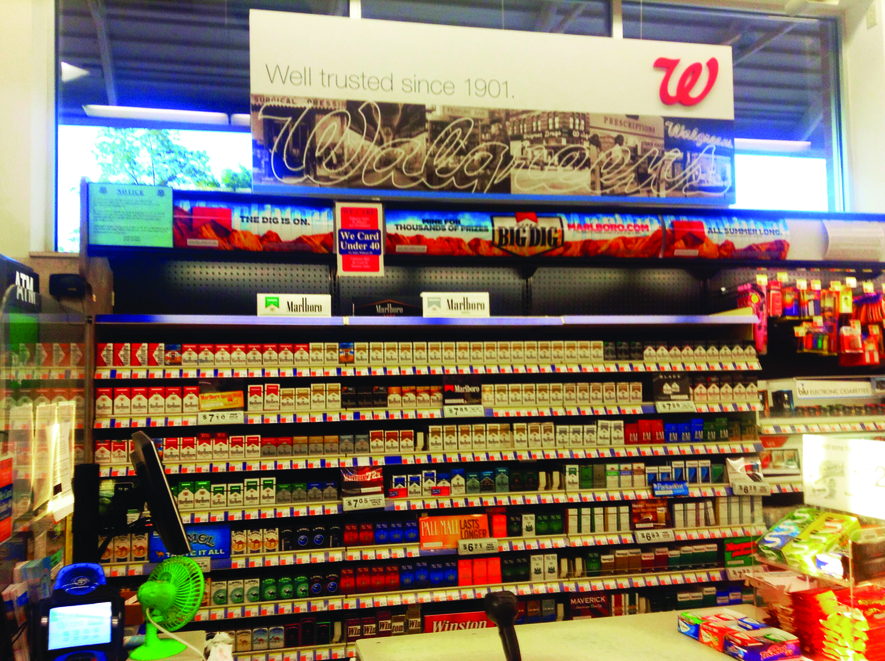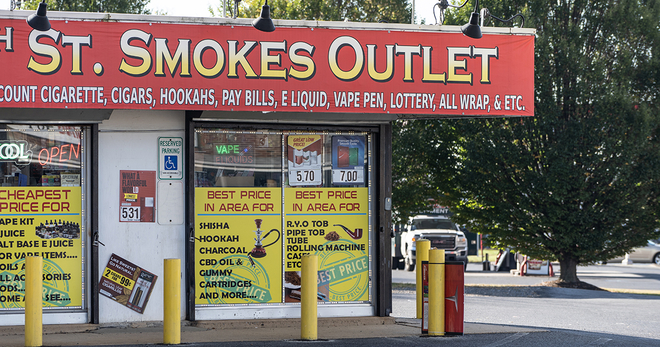Pharmacists and customers agree: Tobacco does not belong in pharmacies
Pharmacies are a top destination for health care, yet most major pharmacy chains sell tobacco — a product that kills 1,300 people every day and remains the leading cause of preventable death and disease in the U.S.
As healthcare providers, many pharmacists recognize that tobacco does not belong in pharmacies and facilities with pharmacies. Truth Initiative® conducted an online discussion with a group of pharmacists in December 2018 to learn more about how pharmacists view the issue. We found the majority supported restricting sales of tobacco in pharmacies. Some believe such restrictions would improve the health of customers and the community and facilitate their efforts to help patients quit smoking.

As healthcare providers, many pharmacists recognize that tobacco does not belong in pharmacies and facilities with pharmacies.
THE PROBLEM WITH TOBACCO SALES IN PHARMACIES
In 2015, a year after CVS stopped selling tobacco, almost 54,000 pharmacies, or 79 percent of the total number of pharmacies in the U.S., still sold tobacco products. Since then, no other major pharmacy chain has discontinued tobacco sales, with most of the leading pharmacy retailers, including Walgreens, Walmart and Rite Aid, continuing to offer tobacco products.
Pharmacies and other tobacco retailers not only sell products — they are the industry’s main advertising and promotion channel. In recent years, the tobacco industry has consistently spent more than 90 percent of its annual multi-billion-dollar cigarette and smokeless tobacco marketing expenditure on point-of-sale marketing — including in-store advertisements, discounts and product displays behind checkout counters. Research shows that tobacco marketing in stores is linked with more young people starting to smoke and decreased success for people attempting to quit.
Studies have also found that cigarette prices are often lower at pharmacies than at other tobacco retailers. In addition, pharmacies continue to be caught illegally selling cigarettes to minors in Food and Drug Administration sting operations. Between 2012 and 2017, U.S. chain pharmacies failed 7.7 percent of FDA inspections of tobacco sales to minors. In 2019, the FDA labeled Walgreens the worst offending pharmacy chain, reporting that 22 percent of the stores inspected have illegally sold tobacco products to minors.
Widespread public support exists for pharmacies to stop selling tobacco and most adults believe tobacco should not be sold in pharmacies. In 2016, the Centers for Disease Control and Prevention found that two-thirds of U.S. adults — including nearly half of smokers — favored a pharmacy tobacco ban. Additionally, in a 2018 survey by Truth Initiative of Walgreens customers, 73 percent of respondents said they would approve of Walgreens banning tobacco sales. Most customers said they would shop at Walgreens just as often (64 percent) or more often (27 percent) if the chain stopped selling tobacco.
Pharmacists, who serve on the frontline of everyday health issues, tend to agree. One study found that 86 percent of pharmacists in western New York preferred to work in a pharmacy that does not sell tobacco. Nearly a decade ago, the 62,000-member American Pharmacists Association issued a policy calling on pharmacies and facilities with pharmacies to stop selling tobacco products.
AMERICAN PHARMACISTS ASSOCIATION TOBACCO POLICY STATEMENT
- APhA urges pharmacies and facilities that include pharmacies to discontinue the sale of tobacco products.
- APhA urges the federal government and state governments to limit participation in government-funded prescription programs to pharmacies that do not sell tobacco products.
- APhA urges state boards of pharmacy to discontinue issuing and renewing licenses to pharmacies that sell tobacco products and to pharmacies that are in facilities that sell tobacco products.
- APhA urges colleges of pharmacy to only use pharmacies that do not sell tobacco products as experience sites for their students.
- APhA urges the Accreditation Council for Pharmacy Education to adopt the position that college-administered pharmacy experience programs should only use pharmacies that do not sell tobacco products.
- APhA urges pharmacists and student pharmacists who are seeking employment opportunities to first consider positions in pharmacies that do not sell tobacco products.
A DISCUSSION WITH PHARMACISTS
In December 2018, Truth Initiative invited a group of pharmacists from around the country to join an online discussion board to explore a range of issues related to tobacco sales in pharmacies and the role of pharmacies in the health of communities. Twenty-nine pharmacists joined the dynamic discussion, moderated by a trained facilitator. Most participants worked in pharmacies without a ban on tobacco sales (54 percent) and more than half of participants (16) worked for Walgreens, the country’s second largest pharmacy chain and the largest that continues to sell tobacco. CVS, the largest chain, stopped selling tobacco in 2014. Discussion board transcripts were analyzed using thematic analysis.
Overall, we found that:
- Pharmacists viewed themselves as health providers and were concerned about tobacco use among customers. Almost all pharmacists aided patients in quitting smoking and other forms of tobacco.
- Most pharmacists supported policies to restrict tobacco sales in pharmacies and many also highlighted the benefits of such a policy.
- Most pharmacists believed that removing tobacco from pharmacies would improve the health of customers and the community. Over half of pharmacists working in tobacco-free pharmacies felt the policy provided more opportunities to counsel patients on quitting tobacco.
- Pharmacists discussed how removing tobacco from the shelves would have an impact on business, both through decreased profits and through positive impact on brand and image.
PHARMACISTS VIEWED THEMSELVES AS HEALTH CARE PROVIDERS
Through their online discussion, pharmacists portrayed themselves as dedicated health care providers who were devoted to serving their community.
- Health first: Pharmacists viewed themselves as part of a health care team and viewed their customers as patients. One respondent described an important “partnership between the provider, the patient and the pharmacist…” (respondent worked at a non-Walgreens pharmacy without a ban). Pharmacists said they were focused on patient treatment, with many making a distinction between “front of the store” where tobacco is sold and “back of the store” where prescriptions are filled.
- Opportunities for engagement and education: Pharmacists felt a responsibility to provide health education. Many suspected they were the health care professional that many patients saw most often, which provided them opportunities to educate and intervene. “The role of a pharmacist is to provide optimal health and education for our patients. By educating our patients and being there for them with regards to their health issues we can help them live longer and better lives” (respondent was a Walgreens pharmacist working at a store without a ban on tobacco).
- Identifying the impact of tobacco: Pharmacists recognized the negative health effects of tobacco use and had witnessed their patients’ struggles to quit tobacco.
- Support for quitting: Nearly all pharmacists in the study had aided patients in quitting cigarettes and other forms of tobacco. Pharmacists suggested over-the-counter and prescription products — such as gums and patches — and referred patients to primary care physicians or nearby quit-smoking classes.
- Frustration with continued tobacco use: Several participants expressed frustration about filling prescriptions to treat tobacco-related diseases or for medications that could negatively interact with tobacco when they suspected that patients would continue to smoke. One pharmacist even refused to allow customers to purchase tobacco at the pharmacy counter in protest.

The role of a pharmacist is to provide optimal health and education for our patients. By educating our patients and being there for them with regards to their health issues we can help them live longer and better lives.
PHARMACISTS SUPPORTED POLICIES TO RESTRICT TOBACCO SALES AND HIGHLIGHT POLICY BENEFITS
An overwhelming majority of pharmacists supported a policy to restrict tobacco sales at all Walgreens pharmacies. Most were also in favor of a nationwide restriction on tobacco sales in pharmacies.
- Little pushback from customers of tobacco-free pharmacies: Participants who worked in pharmacies without tobacco reported that their patients had mostly neutral or positive reactions to the policy. While some pharmacists reported initial questions from their patients about selling tobacco, most customers had come to accept it or were unaffected by the change.
- Banning tobacco increased trust: Some pharmacists felt that their store’s ban made them a more trusted partner in health care and made it easier to discuss quitting tobacco with their patients: “My customers take me seriously as a professional when I counsel them against smoking. Pharmacists that don’t have support from their companies are in a much worse place” (respondent was a non-Walgreens pharmacist working at a store with a ban on tobacco).
- Tobacco and health do not mix: Some participants contended that pharmacies had no business selling tobacco in a place where people come to seek health care, and most supported the American Pharmacists Association policy statement. As one Walgreens pharmacist said, “I think it will be a healthy path for our institution to take, I think it will promote a wellness and positive atmosphere” (respondent was a Walgreens pharmacist working at a store without a ban on tobacco). Another pharmacist commented that “you cannot seriously tell someone not to smoke while selling cigarettes. Products containing sugar are not generalizable, since they’re fine in moderation. No amount of smoking is safe” (respondent was a non- Walgreens pharmacists working at a store with a ban on tobacco).

You cannot seriously tell someone not to smoke while selling cigarettes. Products containing sugar are not generalizable, since they’re fine in moderation. No amount of smoking is safe.
PHARMACISTS BELIEVED REMOVING TOBACCO FROM PHARMACIES WOULD IMPROVE HEALTH
Believe that limiting access to tobacco by removing tobacco products from pharmacies is an important step in promoting the health of their patients and community.
- Reducing purchasing opportunities: Many pharmacists believed that the inconvenience of a sales ban in pharmacies could decrease consumption. According to one pharmacist working in a store with a tobacco ban: “We know that customers are smoking less. They will have to make an extra stop to another store if they want tobacco products. Sometimes they run out of time and then will smoke less” (non-Walgreens pharmacist working at a store with a ban on tobacco).
- Supporting the community: Most participants working in pharmacies with a tobacco ban felt the restriction could improve the health of their customers. “I agree 100% [with the APhA policy statement]. Pharmacies that offer tobacco are harming patients and should be penalized. We’re there to provide education and medicine to help patients improve their overall health. Tobacco sales are sending the wrong message” (respondent was a Walgreens pharmacist working at a store without a ban on tobacco). Another pharmacist who serves a community with a high percentage of asthmatics and hypertensive patients reported that the tobacco ban was viewed very positively by community members. The majority of pharmacists who work in places that currently sell tobacco were similarly optimistic about the overall health benefits of removing tobacco from their shelves.
- Encouraging quitting: While some noted that, unlike other tobacco retailers, pharmacies do have resources to help with quitting, most believed banning tobacco would help customers to recognize the negative impact of smoking on their health and would encourage smokers to quit.

I agree 100% [with the APhA policy statement]. Pharmacies that offer tobacco are harming patients and should be penalized. We’re there to provide education and medicine to help patients improve their overall health. Tobacco sales are sending the wrong message.
PHARMACISTS CONSIDERED THE IMPACT ON BUSINESS
Even though most pharmacists supported removing tobacco from Walgreens stores, they were not naive about the potential impact on the company’s business. They acknowledged the potential loss in revenue, while highlighting benefits to the pharmacy’s brand.
- Potential for negative impact: Nearly half of pharmacists felt that removing tobacco would have a negative impact on Walgreens’ business. Many respondents recognized that tobacco sales generated profit for Walgreens and believed this was the main reason that Walgreens continues to sell these products.
- Impact on profit: Most believed that removing tobacco would impact overall profit, but the degree of impact discussed varied significantly from “slightly negative” (Walgreens pharmacist working at a store without a ban on tobacco) to “significant loss in revenue” (Walgreens pharmacist working at a store without a ban on tobacco). Some also believed that removing tobacco would have unintended consequences, like decreasing foot traffic and thus overall sales. Others were more optimistic, noting that CVS had successfully managed the change.
- Boost to brand: Some pharmacists believed that Walgreens’ initial loss from banning tobacco would eventually be offset by its improved reputation. “Obviously, there will be a loss of revenue, but I feel this would be a minor hit to overall income reported. Possibly more individuals and funds would buy the stock due to the stopping of tobacco sales” (Walgreens pharmacist working at a store with a ban on tobacco). Another pharmacist summarized the topic succinctly: “I know people that shop and get their RXs at CVS because they stopped selling tobacco. I believe that people will appreciate the fact that Walgreens no longer sells tobacco” (respondent was a Walgreens pharmacists working at a store without a ban on tobacco).

PHARMACIES MUST FIRST SUPPORT HEALTH
To the majority of pharmacists in this study, the truth is clear: There is no place for tobacco in a store focused on health. With their positions on the front line of health care, pharmacists understand their unique opportunity to observe, engage and support their patients’ health. The results from our discussion highlight how pharmacists predominately believe that banning tobacco from pharmacies not only reduces opportunities to purchase tobacco, but also reaffirms pharmacies’ commitment to the health of their customers.
Truth Initiative has long supported tobacco-free pharmacies and has led a series of activism efforts aimed at getting pharmacies to stop selling tobacco. Thousands of young people have signed truth® petitions supporting tobacco-free pharmacies, and many have shown up to one of five protests hosted in recent years across the country, including a zombie-themed protest at the Washington, D.C., flagship Walgreens store. For the past three years, Truth Initiative has also brought young people and pharmacists to the annual Walgreens shareholders meeting to directly ask about eliminating tobacco products from its stores.
The time has come for pharmacies across the country to put their policies where their slogans are. Pharmacies that keep tobacco on their shelves undermine the well-being of their communities. For pharmacists to carry out their professional duty to guide their patients to better health, pharmacies must remove tobacco from their stores.
More in tobacco industry marketing
Want support quitting? Join EX Program
By clicking JOIN, you agree to the Terms, Text Message Terms and Privacy Policy.
Msg&Data rates may apply; msgs are automated.



